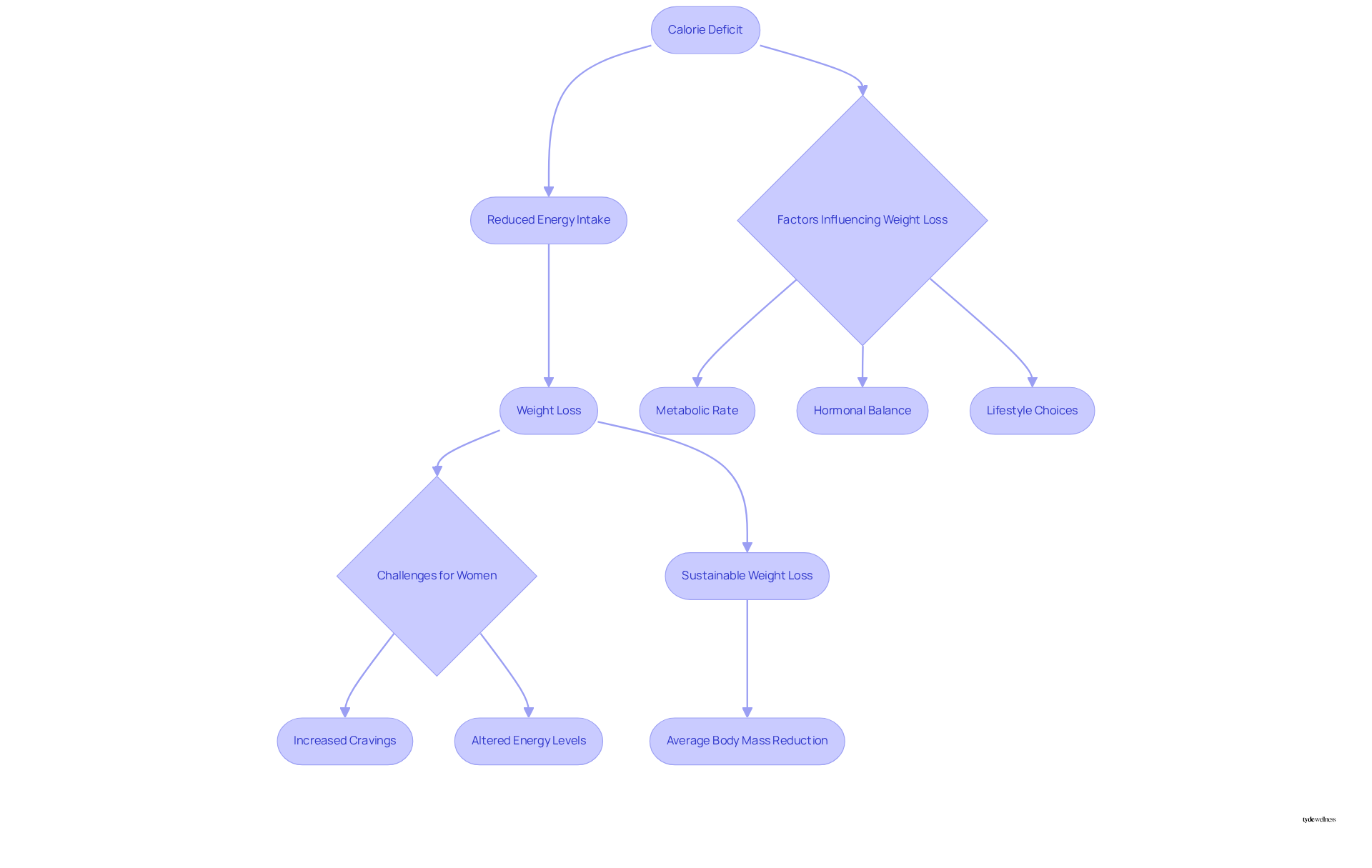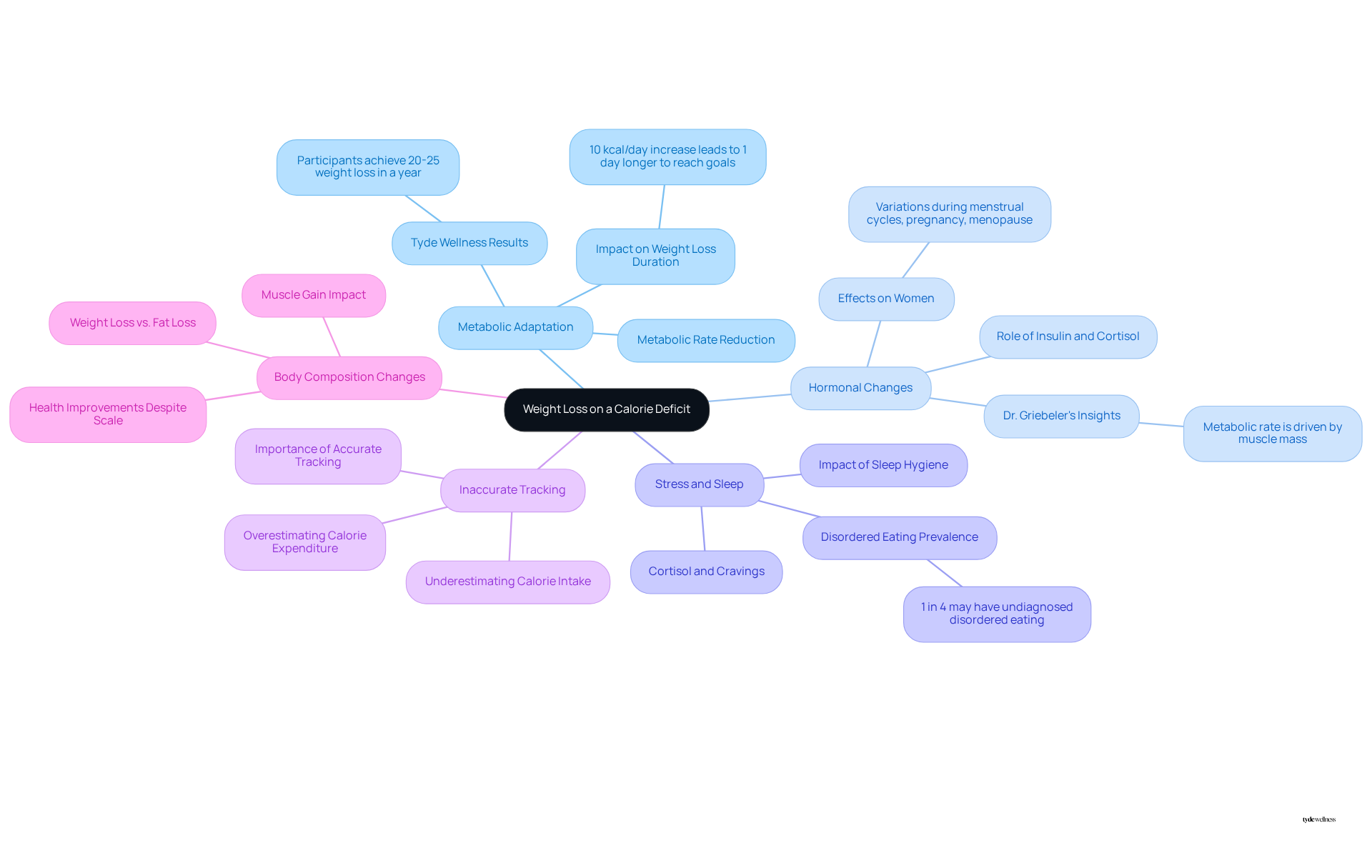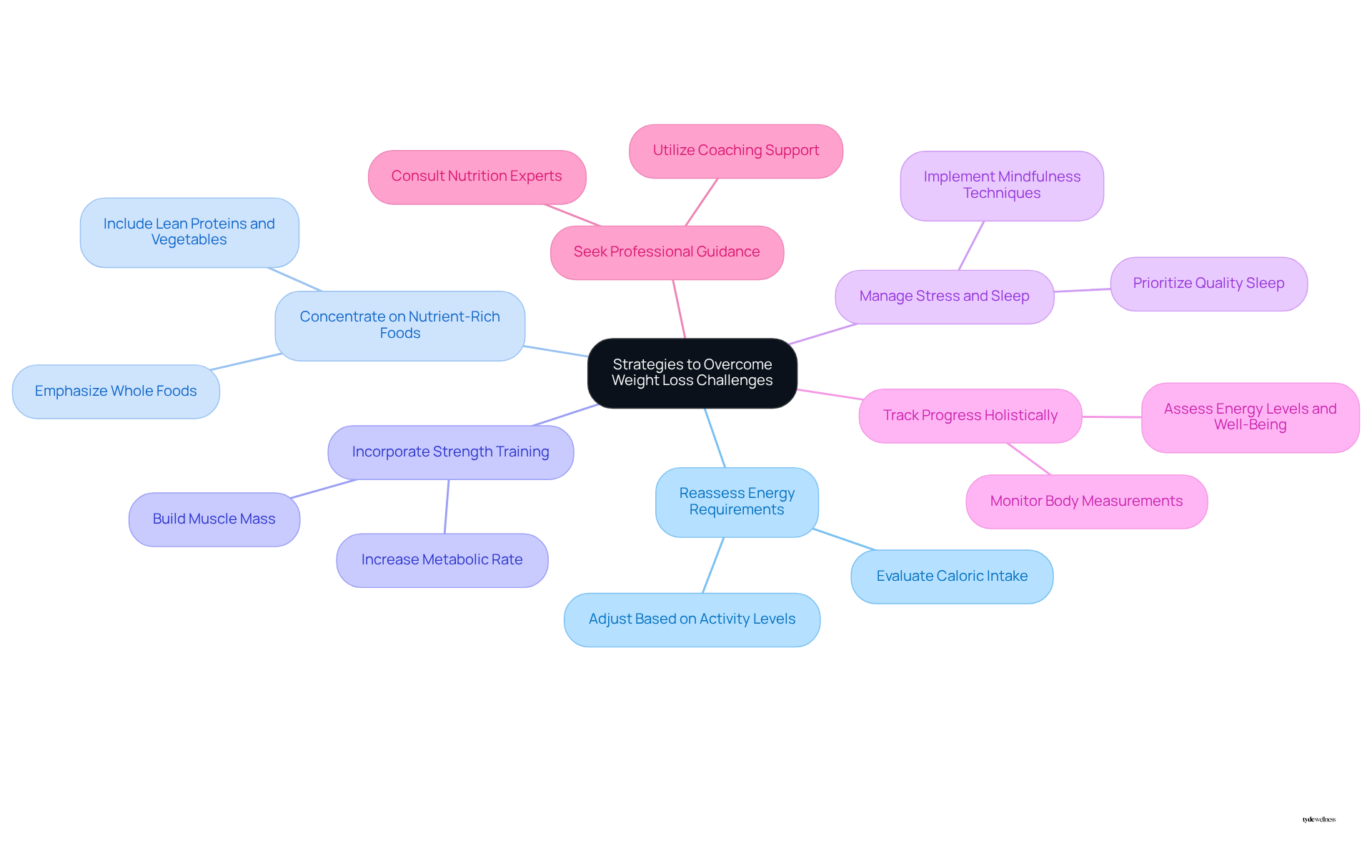Overview
The primary reason individuals may struggle to lose weight on a calorie deficit stems from several factors, including:
- Metabolic adaptation
- Hormonal changes
- Stress
- Inaccurate tracking of calorie intake
These elements can significantly complicate weight loss efforts, particularly for women undergoing hormonal shifts. It is essential to recognize that tailored strategies are crucial for effectively navigating these challenges. By implementing personalized approaches, individuals can achieve sustainable weight loss and enhance their overall well-being.
Introduction
Understanding the intricacies of weight loss can often feel like navigating a maze, particularly when the fundamental principle of a calorie deficit appears to falter. Despite diligent tracking of intake and calorie reduction, many individuals find themselves questioning, “Why am I not losing weight on a calorie deficit?” This article explores the multifaceted reasons behind this frustrating phenomenon, examining critical factors such as:
- Metabolic adaptation
- Hormonal fluctuations
- Lifestyle influences
These factors can impede progress. As the journey toward weight loss becomes increasingly complex, it is essential to consider what strategies individuals can employ to overcome these challenges and achieve their health goals.
Understanding Calorie Deficits and Weight Loss
A reduction in energy intake occurs when a person consumes fewer units of energy than their body expends, forming the foundation for effective strategies aimed at reducing body mass. To lose one pound of fat, a deficit of 3,500 units of energy is required over the course of a week, which translates to a daily reduction of 500 units. When the body experiences an energy deficit, it begins to utilize stored fat for fuel, leading to gradual weight loss over time.
However, the effectiveness of maintaining a caloric deficit raises the question of why am I not losing weight on a calorie deficit, as it can fluctuate based on various factors, including metabolic rate, hormonal balance, and individual lifestyle choices. For women, particularly those experiencing hormonal shifts during perimenopause or menopause, the dynamics of energy deficits become increasingly complex. Hormonal changes can significantly influence metabolism and appetite regulation, leading to the question of why am I not losing weight on a calorie deficit, which makes it more challenging to sustain a deficit in energy intake and achieve weight loss goals.
Research indicates that women undergoing these hormonal transitions may face unique challenges, such as increased cravings and altered energy levels, which can lead them to wonder, ‘why am I not losing weight on a calorie deficit’ despite their efforts to lose body mass. Dr. Johanna Keeler notes that ‘initiating a restricted dietary plan without observing reductions in mass, or engaging in ‘mass cycling’ may not yield improvements in depression and could be discouraging or demoralizing, leading to an increase in depressive symptoms.’
Consequently, a nuanced understanding of how calorie deficits interact with hormonal changes is essential for achieving sustainable and effective weight loss. By embracing a balanced approach that takes these factors into account, women can more effectively navigate their journeys toward a healthier body and improved overall well-being.
Participants in Tyde Wellness’s program have reported an average body mass reduction of 15% after 68 weeks, with many achieving a decrease of over 20-25% within a year, demonstrating the effectiveness of tailored solutions in reaching health objectives.

Key Factors Affecting Weight Loss on a Calorie Deficit
Several key factors can hinder weight loss even when an individual is in a calorie deficit:
-
Metabolic Adaptation: As individuals reduce their mass, their metabolic rate frequently diminishes. This reduction necessitates further modifications to calorie intake to sustain fat reduction. Studies indicate that for every 10 kcal/day rise in metabolic adaptation, the duration needed to achieve reduction goals increases by one day. Participants in Tyde Wellness often attain a reduction exceeding 20-25% within a year, showcasing the effectiveness of customized approaches despite these challenges.
-
Hormonal Changes: Hormones such as insulin, cortisol, and sex hormones play a crucial role in regulating appetite and fat storage. For women, variations during menstrual cycles, pregnancy, and menopause can complicate efforts to reduce body mass. Dr. Marcio Griebeler emphasizes that these hormonal changes can lead to increased hunger and altered fat distribution, making body composition management more challenging. He notes, “Metabolic rate is, in part, driven by your muscle mass,” highlighting the importance of individualized plans.
-
Stress and Sleep: Increased stress levels and inadequate sleep can disrupt hormonal balance, encouraging weight gain or hindering loss. Cortisol, known as the stress hormone, can heighten cravings for high-calorie foods, which raises the question of why am I not losing weight on a calorie deficit. Addressing stress and enhancing sleep hygiene are essential components of effective body management. Notably, almost one in four individuals in weight reduction programs may have undiagnosed disordered eating, underscoring the complexity of these issues.
-
Inaccurate Tracking: Inaccurate tracking can cause many individuals to underestimate their calorie intake or overestimate their calorie expenditure, leading them to question why am I not losing weight on a calorie deficit. Accurate tracking of food intake and physical activity is vital for understanding true energy balance.
-
Body Composition Changes: Reducing weight does not always correspond to a decrease in fat. Muscle gain can counterbalance fat reduction on the scale, leading to frustration. It’s important to acknowledge that alterations in body composition, such as increased muscle mass, can improve overall health and metabolic rate, even if the scale does not indicate significant reduction.
Understanding these elements is essential for women, particularly those experiencing hormonal shifts, as they can greatly impact results related to shedding pounds. By addressing metabolic adaptation and hormonal fluctuations, individuals can develop more effective strategies for achieving their target reductions.

Strategies to Overcome Weight Loss Challenges
To tackle the obstacles related to why am I not losing weight on a calorie deficit, individuals can apply several strategies.
- Reassess Energy Requirements: Regularly evaluate and modify energy intake based on progress in shedding pounds and changes in activity levels. This ensures that caloric intake aligns with the body’s evolving requirements.
- Concentrate on Nutrient-Rich Foods: Emphasize whole, nutrient-rich foods that offer fullness without excessive energy. This encompasses lean proteins, whole grains, fruits, and vegetables, which can greatly improve loss efforts.
- Incorporate Strength Training: Building muscle can help increase metabolic rate and improve body composition, making it easier to lose fat. Research indicates that women who incorporate strength training into their routines can experience improved body composition and increased calorie burn.
- Manage Stress and Sleep: Implement stress-reduction techniques such as mindfulness, yoga, or meditation, and prioritize quality sleep to support hormonal balance, which is essential for effective management of body composition.
- Track Progress Holistically: Instead of solely focusing on the scale, consider other metrics of progress, such as body measurements, energy levels, and overall well-being. This comprehensive approach can provide a more accurate picture of health improvements.
- Seek Professional Guidance: Consulting with a nutrition expert or health coach can provide personalized strategies and support, particularly for women navigating hormonal transitions. Tyde Wellness provides physician-guided GLP-1 therapy and continual coaching assistance, which can help tackle individual challenges and improve the efficacy of slimming endeavors.
By applying these strategies, individuals can more effectively sustain a calorie deficit and understand why am I not losing weight on a calorie deficit, ultimately leading to lasting reductions in body mass. Participants at Tyde Wellness report an average body weight loss of 15% after 68 weeks, with many achieving over 20-25% weight loss within a year, demonstrating the effectiveness of these approaches.

Conclusion
Understanding the reasons behind difficulties in losing weight on a calorie deficit is essential for anyone aiming to achieve their weight loss goals. The complexities of weight management go beyond simply consuming fewer calories; they involve metabolic adaptations, hormonal shifts, and individual lifestyle factors that can significantly impact outcomes. By recognizing these dynamics, individuals—especially women facing hormonal challenges—can navigate their weight loss journeys more effectively.
Key arguments throughout this discussion emphasize the significance of factors such as:
- Metabolic adaptation
- Hormonal changes
- Stress
- Sleep
- The accuracy of tracking food intake
Each of these elements plays a crucial role in determining the success of a calorie deficit. Furthermore, strategies like reassessing energy requirements, focusing on nutrient-rich foods, incorporating strength training, and managing stress and sleep can empower individuals to overcome obstacles and achieve sustainable weight loss.
Ultimately, the journey toward effective weight loss on a calorie deficit is multifaceted and necessitates a comprehensive approach. By understanding and addressing the various challenges that may arise, individuals can cultivate a healthier relationship with their bodies and enhance their overall well-being. Embracing these insights and implementing tailored strategies can transform the weight loss experience, leading to lasting results and a more fulfilling lifestyle.
Frequently Asked Questions
What is a calorie deficit and how does it relate to weight loss?
A calorie deficit occurs when a person consumes fewer units of energy than their body expends. To lose one pound of fat, a deficit of 3,500 units of energy is required over a week, which means a daily reduction of 500 units.
Why might someone not lose weight even when maintaining a calorie deficit?
Weight loss can fluctuate due to various factors, including metabolic rate, hormonal balance, and individual lifestyle choices. These factors can affect the body’s ability to sustain a calorie deficit and achieve weight loss.
How do hormonal changes impact weight loss for women?
Hormonal shifts, particularly during perimenopause or menopause, can complicate energy deficits. These changes can influence metabolism and appetite regulation, leading to challenges in maintaining a calorie deficit and achieving weight loss goals.
What unique challenges do women face regarding calorie deficits during hormonal transitions?
Women undergoing hormonal transitions may experience increased cravings and altered energy levels, which can make it harder to sustain a calorie deficit despite their weight loss efforts.
What should individuals consider when trying to lose weight on a calorie deficit?
A nuanced understanding of how calorie deficits interact with hormonal changes is essential. A balanced approach that considers these factors can help individuals navigate their weight loss journeys more effectively.
What results have participants in Tyde Wellness’s program reported?
Participants in Tyde Wellness’s program have reported an average body mass reduction of 15% after 68 weeks, with many achieving a decrease of over 20-25% within a year, indicating the effectiveness of tailored solutions for health objectives.
List of Sources
- Understanding Calorie Deficits and Weight Loss
- Calorie Deficit Key to Weight Loss – Here’s Why (https://orlandohealth.com/content-hub/calorie-deficit-key-to-weight-loss-heres-why)
- Calorie-cutting diets could be tied to worsening depression, study suggests | CNN (https://cnn.com/2025/06/03/health/diet-calories-depression-wellness)
- Good Weight-Loss Diets Avoid Processed Foods, Study Finds (https://usnews.com/news/health-news/articles/2025-08-05/good-weight-loss-diets-avoid-processed-foods-study-finds)
- 4:3 Intermittent Fasting Outperforms Daily Calorie Restriction in Weight-Loss Study (https://news.cuanschutz.edu/news-stories/intermittent-fasting-outperforms-calorie-counting-in-weight-loss-study)
- Your Best Health (https://nch.org/news/why-is-it-so-hard-for-women-over-50-to-lose-weight)
- Key Factors Affecting Weight Loss on a Calorie Deficit
- Metabolic adaptation delays time to reach weight loss goals – PMC (https://pmc.ncbi.nlm.nih.gov/articles/PMC8852805)
- Why It Really Is Harder for Women To Lose Weight (and What To Do About It) (https://health.clevelandclinic.org/why-it-really-is-harder-for-women-to-lose-weight-and-what-to-do)
- I’m a personal trainer — here’s the sneaky reason why you’re not losing weight (https://nypost.com/2024/09/13/health/metabolic-adaptation-why-youre-not-losing-weight-trainer)
- Weight Loss Drugs 101: Benefits and risks you need to know before picking up a prescription (https://vcuhealth.org/news/weight-loss-drugs-101-benefits-and-risks-you-need-to-know-before-picking-up-a-prescription)
- Weight loss may take longer than expected due to metabolic adaptation (https://uab.edu/news/research-innovation/weight-loss-may-take-longer-than-expected-due-to-metabolic-adaptation)
- Strategies to Overcome Weight Loss Challenges
- 10 Practical Tips to Jumpstart Your Weight Loss and Thrive in 2025 (https://macrosinc.net/blog/10-practical-tips-to-jumpstart-your-weight-loss-and-thrive-in-2025)
- 5 New Rules To Revolutionize Your Weight Loss Strategy in 2025 – Muscle & Fitness (https://muscleandfitness.com/muscle-fitness-hers/hers-features/5-new-rules-to-revolutionize-your-weight-loss-strategy-in-2025)
- 6 proven strategies for weight-loss success (https://mayoclinic.org/healthy-lifestyle/weight-loss/in-depth/weight-loss/art-20047752)
- How Can You Overcome the Challenges of Weight Loss? – Synergy Health 360 (https://synergyhealth360.com/360-wellness/how-can-you-overcome-the-challenges-of-weight-loss)
- Steps for Losing Weight (https://cdc.gov/healthy-weight-growth/losing-weight)



